|
|
|
Sort Order |
|
|
|
Items / Page
|
|
|
|
|
|
|
| Srl | Item |
| 1 |
ID:
127154
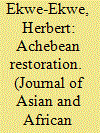

|
|
|
|
|
| Publication |
2013.
|
| Summary/Abstract |
Chinua Achebe and his work represent the restoration of the African as the central focus of deliberation and agency. The importance of that cannot be over-emphasized for a continent and its peoples who were conquered and occupied most devastatingly by Europeans. Achebe has accomplished that task by: (1) ensuring that there is no universal loss of memory of the historic realities of African sovereignty and independence before conquest nor of the regenerative seeds of African freedom that survived the occupation and (2) by countering the conquest literature of the aftermath.
|
|
|
|
|
|
|
|
|
|
|
|
|
|
|
|
| 2 |
ID:
160478
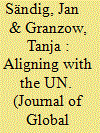

|
|
|
|
|
| Summary/Abstract |
Self-determination campaigns in the Global South have often been pursued through warfare. Since the 1990s, however, an increasing number of such movements have endorsed legalistic mechanisms of international law and the UN's core principle of nonviolence. We introduce the concept of UN-aligned self-determination movements for them. As a starting point to explain their occurrence, we examine two major cases: The Peaceful Southern Movement (Hirak) in Yemen and the Movement for the Actualization of the Sovereign State of Biafra (MASSOB) in contemporary Nigeria. Our analysis combines theories on political opportunities, diffusion, and framing from social movement, civil resistance, and armed rebellion research. We observe that since the end of the Cold War the rule of law, role of the UN, and norms of nonviolent conflict resolution have been strengthened in the international system. We argue that this has given self-determination movements in the Global South new opportunities for claims-making: Facing repressive governments, the leaders of Hirak and MASSOB have successfully aligned their movements with the UN by diffusing its core principles to the local struggle through resonant collective action frames. Thereby, our study contributes to understanding the diffusion of nonviolence in the international system, in particular in self-determination campaigns, and directs attention to the rise of UN-aligned self-determination movements.
|
|
|
|
|
|
|
|
|
|
|
|
|
|
|
|
| 3 |
ID:
127489
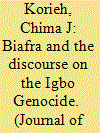

|
|
|
|
|
| Publication |
2013.
|
| Summary/Abstract |
There has been a reluctance or indifference to a systematic study and documentation of the Igbo Genocide in Nigeria. In the main, the reason has been due to official and non-official attempts to subvert a focus on an event in which more than one million Igbo were slaughtered through a process that was fomented, orchestrated, executed, and supervised by the Nigerian state.
|
|
|
|
|
|
|
|
|
|
|
|
|
|
|
|
| 4 |
ID:
133427


|
|
|
|
|
| Publication |
2014.
|
| Summary/Abstract |
Based on anthropological field work in southeastern Nigeria, this paper explores the public concerns and everyday experience of corruption in a society still living with the legacies of the Biafran secession attempt. The paper shows how the revival of Igbo nationalism and resentment over perceived marginalisation is fuelled by perceptions that the corrupt machinery of the federal government runs against the interests of the Igbo people, and funnels resources away from the southeast as punishment for the failed separatist struggle more than 40 years ago. Hence, complaints about corruption are used to critique the Nigerian state and other regional or ethnic groups, but they also figure in an internally focused critique by Igbos of their own complicity in Nigeria's endemic corruption.
|
|
|
|
|
|
|
|
|
|
|
|
|
|
|
|
| 5 |
ID:
134290
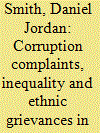

|
|
|
|
|
| Summary/Abstract |
Based on anthropological field work in southeastern Nigeria, this paper explores the public concerns and everyday experience of corruption in a society still living with the legacies of the Biafran secession attempt. The paper shows how the revival of Igbo nationalism and resentment over perceived marginalisation is fuelled by perceptions that the corrupt machinery of the federal government runs against the interests of the Igbo people, and funnels resources away from the southeast as punishment for the failed separatist struggle more than 40 years ago. Hence, complaints about corruption are used to critique the Nigerian state and other regional or ethnic groups, but they also figure in an internally focused critique by Igbos of their own complicity in Nigeria’s endemic corruption.
|
|
|
|
|
|
|
|
|
|
|
|
|
|
|
|
| 6 |
ID:
127152
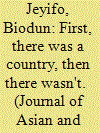

|
|
|
|
|
| Publication |
2013.
|
| Summary/Abstract |
Chinua Achebe is one of the greatest realist writers in world literature in perhaps the last one and half centuries. But the Achebe that appears in There Was a Country is to me entirely a new one. The challenge is how to characterize this other Achebe that is standing beside the old, urbane and subtle writer in this new book.
|
|
|
|
|
|
|
|
|
|
|
|
|
|
|
|
| 7 |
ID:
139100
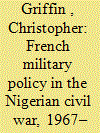

|
|
|
|
|
| Summary/Abstract |
During the Nigerian Civil War (1967–1970), France chose to support Biafra, but only on a limited scale, providing mercenaries and obsolete weaponry to Ojukwu's regime. General Charles de Gaulle's assistance to Ojukwu was conditioned by the French military drawdown after 1961, the increased power of French secret services on the continent, and the interventions in Katanga (1960–1963), Gabon (1964) and Chad (1968–1972). France supported Biafra primarily to protect its former colonies from Nigeria, stop Soviet subversion and acquire an economic foothold in the oil-rich Niger Delta. De Gaulle chose a limited strategy for two reasons. If Biafra won the war, France would be Biafra's greatest ally. If Nigeria won the war, France could extricate itself from the situation relatively easily and re-establish relations with the Nigerian government, which is what ultimately occurred.
|
|
|
|
|
|
|
|
|
|
|
|
|
|
|
|
| 8 |
ID:
127159
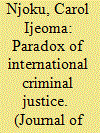

|
|
|
|
|
| Publication |
2013.
|
| Summary/Abstract |
Although early exploits of the international criminal tribunals seem promising, a unique empirical evaluation of its impact in global applications of criminal justice proves defective. A well-intentioned pursuit of criminal justice will ensure consistency and stability in the enforcement of the international humanitarian laws and principles to prevent impunity in situations of war or armed conflict. This study makes a trans-national evaluation of effectiveness of the criminal justice system with particular reference to issues that derive from the Nigeria-Biafra (Biafra) war. The framework of analyses is based on genocidal issues and incidences of war crimes highlighted in Chinua Achebe's There was a Country: A Personal History of Biafra and related literature on the Biafra war.
|
|
|
|
|
|
|
|
|
|
|
|
|
|
|
|
| 9 |
ID:
172345
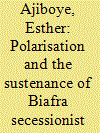

|
|
|
|
|
| Summary/Abstract |
This study examines polarisation in citizens’ online discourses about Biafra agitations in Nigeria. Using critical discourse analysis and the appraisal framework, it analyses 350 Biafra-related posts sampled from Nigerian digital communities. Analysis reveals that polarisation is discursively strengthened through labelling, ethnocentrism, generalisations, and historical allusions. This study concludes that the creation, consumption and unfettered distribution of such polarised discourses reflect Nigeria’s unitarist-federalism. It adds that the instigation of this socio-political fact about Nigeria can foster the cultivation/reinforcement of cognitive biases, harmful ideologies, and consequently, radicalisation/violence. It recommends that the minders of the Nigerian state should amicably address the Biafran agitations.
|
|
|
|
|
|
|
|
|
|
|
|
|
|
|
|
| 10 |
ID:
156557
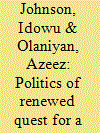

|
|
|
|
|
| Summary/Abstract |
The quest for a Biafran Republic by the Igbo ethnic group has become a recurring demand in Nigeria since the late 1960s. The agitation has been premised on claims of marginalisation and exclusion of the Igbo people in the Nigerian body politic. In spite of the consistency of the agitation through various Administrations, there was a noticeable lull in such demands during the time of President Goodluck Jonathan, only to assume a frightening proportion since the advent of the Administration of President Muhammadu Buhari. This article locates the factors in the outcomes of the 2015 general elections: the question of inclusion and representation; the unfinished nature of the Nigerian civil war; economic challenges, miscalculation both on the part of the Igbo people and indiscretion in the initial appointments made by President Muhammadu Buhari. The article recommends political restructuring of Nigeria as one of the ways to address secessionist tendencies.
|
|
|
|
|
|
|
|
|
|
|
|
|
|
|
|
| 11 |
ID:
127145
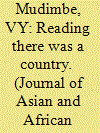

|
|
|
|
|
| Publication |
2013.
|
| Summary/Abstract |
Here is an intellectually dense reading of Chinua Achebe's personal history of Biafra, which deconstructs and illuminates the book. Deconstructive components expose elements of Achebe's narrative that fly beyond the intellectual grasp of his hasty castigators, many of whom vented without having read the book. In the related vein, the illuminative components expose the obligation and burden that Achebe discharged in the book as a Biafran. It is therefore a book whose narrative retraces the responsibility of Achebe's faith vis-à-vis a historical challenge, which he fulfilled with determination by writing it.
|
|
|
|
|
|
|
|
|
|
|
|
|
|
|
|
| 12 |
ID:
148728
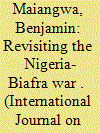

|
|
|
| 13 |
ID:
164662
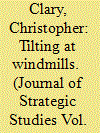

|
|
|
|
|
| Summary/Abstract |
This article examines decision-making mistakes made by U.S. President Nixon and national security advisor Kissinger during the 1971 India-Pakistan crisis and war. It shows that Nixon and Kissinger routinely demonstrated psychological biases that led them to overestimate the likelihood of West Pakistani victory against Bengali rebels as well as the importance of the crisis to broader U.S. policy. The evidence fails to support Nixon and Kissinger’s own framing of the 1971 crisis as a contest between cool-headed realpolitik and idealistic humanitarianism, and instead shows that Kissinger and Nixon’s policy decisions harmed their stated goals because of repeated decision-making errors.
|
|
|
|
|
|
|
|
|
|
|
|
|
|
|
|
|
|
|
|
|